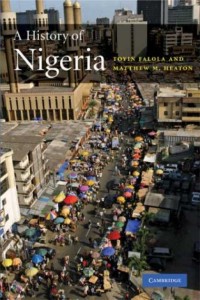|
Reviewed by Edward Lynch, Ph.D., Associate Professor of Political Science and Director of Master of Arts in Liberal Studies Program at Hollins University Given its complex colonial and post-colonial history and emergence as the largest oil producer and most populous country in Africa, any complete history of Nigeria requires an exhaustive survey. With A History of Nigeria, authors Toyin Falola and Matthew Heaton attempt to cover all of this history and, in doing so, pen the definitive narrative of Nigerian history. This is an ambitious book to say the least. The authors point out that most monograph treatments of Nigeria begin with the country’s independence in 1960, ignoring the prologue to its current challenges. Determined to avoid this failing, Falola and Heaton begin with the first human settlements in 9000 BCE and end with the elections of 2007. Covering this much ground in fewer than 400 pages necessarily entails a certain sacrifice of detail and depth, and this is one of the book’s failings. The war over independence for Biafra, for example, merits fewer than 10 pages. As another example, there is not nearly enough treatment of the growing danger to Nigerian and regional stability from the spread of radical Islam throughout the country’s northern states. Commenting on the 2007 elections, the authors note that all of the major candidates came from that part of the country, without any discussion about the possibility that the partisans of Islamist extremism will perceive this development as a victory and reason to expand their reach, and the use of violence, in securing control over even wider tracts of Nigeria. Also lacking is an analysis of the role of foreign groups in fostering the expansion of Sharia law throughout the northern states and the fomenting sectarian violence in the country. Trying to produce a relatively short book on a large subject can also tempt authors to draw conclusions that seem somewhat facile, or at least to omit alternative explanations. Again in the section on the 2007 elections, the authors insist that Nigerians were dissatisfied with the electoral process, jaded about the electoral system, and skeptical of politicians’ promises. But they also note that there was only spotty attendance at rallies urging a boycott of the elections. Falola and Heaton conclude that Nigerians’ indifference is proof of their lack of confidence. Based on the evidence that they provide, it is equally valid to conclude that Nigerians saw no need to boycott the elections, since they were generally satisfied with the choices they faced, and thus had little incentive to attend pro-boycott rallies. One page later, after more commentary on the inadequacies of civilian government in Nigeria, the authors conclude that “the longer that a stable civilian regime can stay in power the better the chances are of developing more solid democratic institutions in the future.” (277). It may also follow, however, that more years of such inadequate democracy could undermine support for civilian rule and make Nigerians, once again, enthusiastic about military rule. I was also struck by the authors’ relative lack of enthusiasm for the administrations of Olusegun Obasanjo in spite of the fact that his years in office saw marked increases in foreign investment, GDP and oil development—all with equally significant decreases in inflation (236). General Obasanjo also has the distinction of having turned over power to civilians, twice. Having made these criticisms, there it still is important to note that Falola and Heaton have produced a valuable survey of Nigeria’s long and often tortured history that will undoubtedly be useful in the college classroom. It would make an ideal supplemental text for a course on African politics or African history. Even if not assigned as required reading, it deserves a place on the shelves of university libraries as every undergraduate student researching Nigeria will find this book very helpful. Scholars of West Africa have, thanks to Falola and Heaton, a worthwhile (if flawed) addition to their personal and/or university library collections. |


 A History of Nigeria
A History of Nigeria